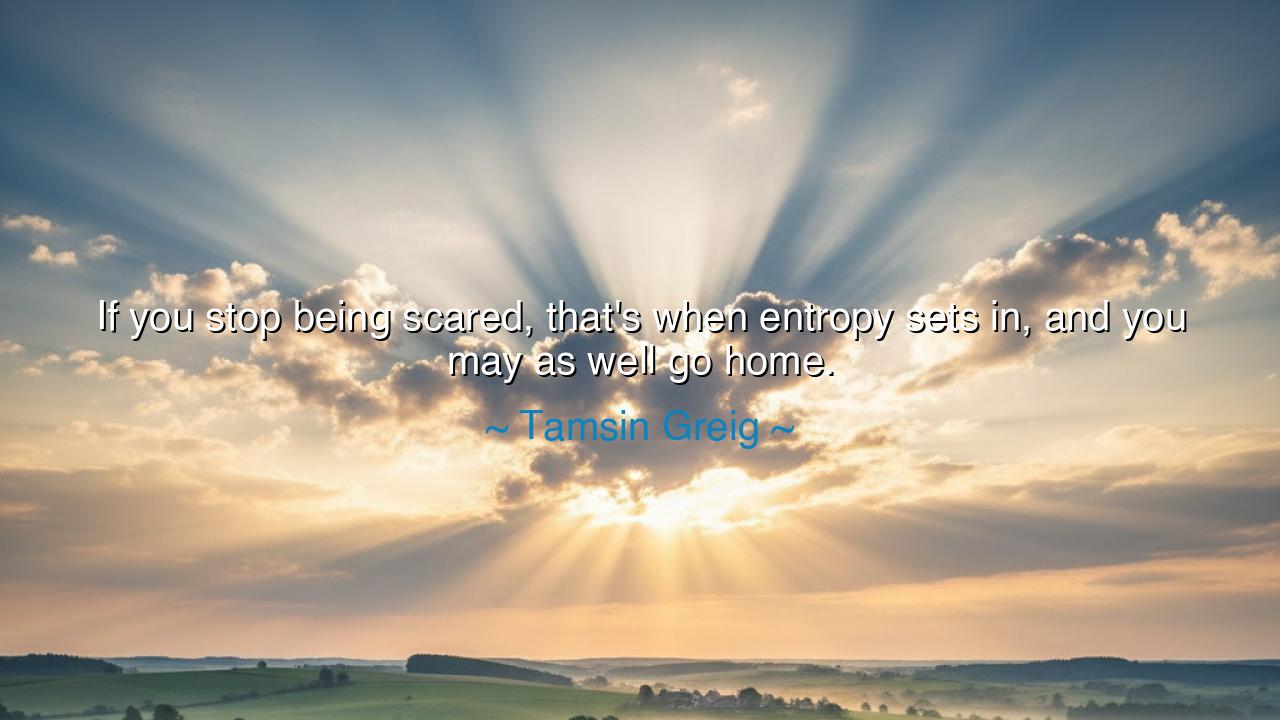
If you stop being scared, that's when entropy sets in, and you






“If you stop being scared, that’s when entropy sets in, and you may as well go home.” Thus spoke Tamsin Greig, the actress of quiet brilliance and deep wit, whose words hold the wisdom of both the stage and the human soul. Beneath her humble tone lies a truth as old as creation itself: that fear, far from being a weakness, is the pulse of growth, and that the moment we stop trembling before the unknown, we begin to decay. Her phrase calls us to a sacred tension—to live not in the comfort of certainty, but in the edge of becoming, where fear is not our enemy, but our teacher.
To understand her words, one must first understand the law she invokes—entropy, that ancient and universal force that governs all things. In the language of physics, entropy is the slow unraveling of order into chaos, the fading of energy into stillness. In the language of the soul, it is the death of curiosity, the dulling of passion, the loss of awe. Greig warns that when we no longer feel fear—when we no longer challenge ourselves, no longer stand trembling before the vastness of possibility—we begin to crumble inwardly. Life becomes repetition, comfort becomes cage, and the spirit, once aflame, grows dim.
There is a sacred paradox in this teaching: that fear, often despised, is in truth a sign of aliveness. The ancients knew this well. The warrior stepping into battle, the artist facing a blank canvas, the philosopher confronting truth—all felt fear, yet all moved forward. Fear is not the shadow of failure, but the herald of transformation. To live without fear is not to live courageously, but to live stagnantly—to have ceased to grow. For fear is the boundary between what we are and what we might become, and only those who step through it discover their greater self.
Consider the tale of Amelia Earhart, the aviator who defied gravity and society alike. She did not fly because she was fearless; she flew because she carried her fear into the sky. Each ascent was a dialogue between courage and trembling, between mortality and motion. “Courage,” she once said, “is the price that life exacts for granting peace.” And indeed, her peace was not born of safety, but of struggle. In her, we see the truth of Greig’s words: that fear, embraced rather than denied, becomes the fire that keeps entropy at bay—the divine restlessness that drives us ever forward.
When entropy sets in, it begins not in the body, but in the mind. It comes quietly—in the decision to stop learning, to stop questioning, to stop risking one’s heart for something greater. It disguises itself as contentment, but beneath that calm lies surrender. The artist who no longer dares to create, the teacher who no longer seeks to learn, the dreamer who no longer dreams—all have fallen into the stillness of entropy. They may walk and breathe, but their inner world has ceased to expand. Thus Greig warns, “you may as well go home”—for without fear, without challenge, one has already begun the journey toward stillness, the slow decline into spiritual silence.
But her words are not meant to frighten; they are meant to awaken. She calls us to live with sacred tension—to dwell in the space where fear sharpens purpose. To be scared is to be alive, to feel the weight of what matters. The mountain climber’s trembling hands, the parent’s anxious hope, the creator’s doubt before the unveiling—all these are proof of the living heart, refusing to surrender to complacency. To be scared is to stand before mystery and still choose to step forward. It is the sign that we have not yet become numb, that we are still capable of wonder.
So, my children of the brave heart, take this teaching deeply: do not seek a life without fear. Seek instead the courage to let fear refine you, to keep you awake, to drive you toward new horizons. When fear whispers that you might fail, answer that failure is proof of trying. When it warns that you are unready, answer that readiness is born only from the attempt. For fear is not the end—it is the beginning of everything that matters.
In the end, Tamsin Greig’s words are a hymn to motion, to evolution, to the eternal struggle against stillness. Life itself began in turbulence—the storm of atoms, the fire of stars—and so must our spirits live in that same holy unrest. When you feel fear rising within you, do not flee it; bow to it as to a teacher. For it is fear that guards the threshold between what is safe and what is sacred. And when the day comes that you no longer tremble, no longer burn, no longer dream—then, indeed, entropy has set in, and you may as well go home. But until that day, walk boldly, even trembling, into the unknown—for it is there that the living truly live.






AAdministratorAdministrator
Welcome, honored guests. Please leave a comment, we will respond soon